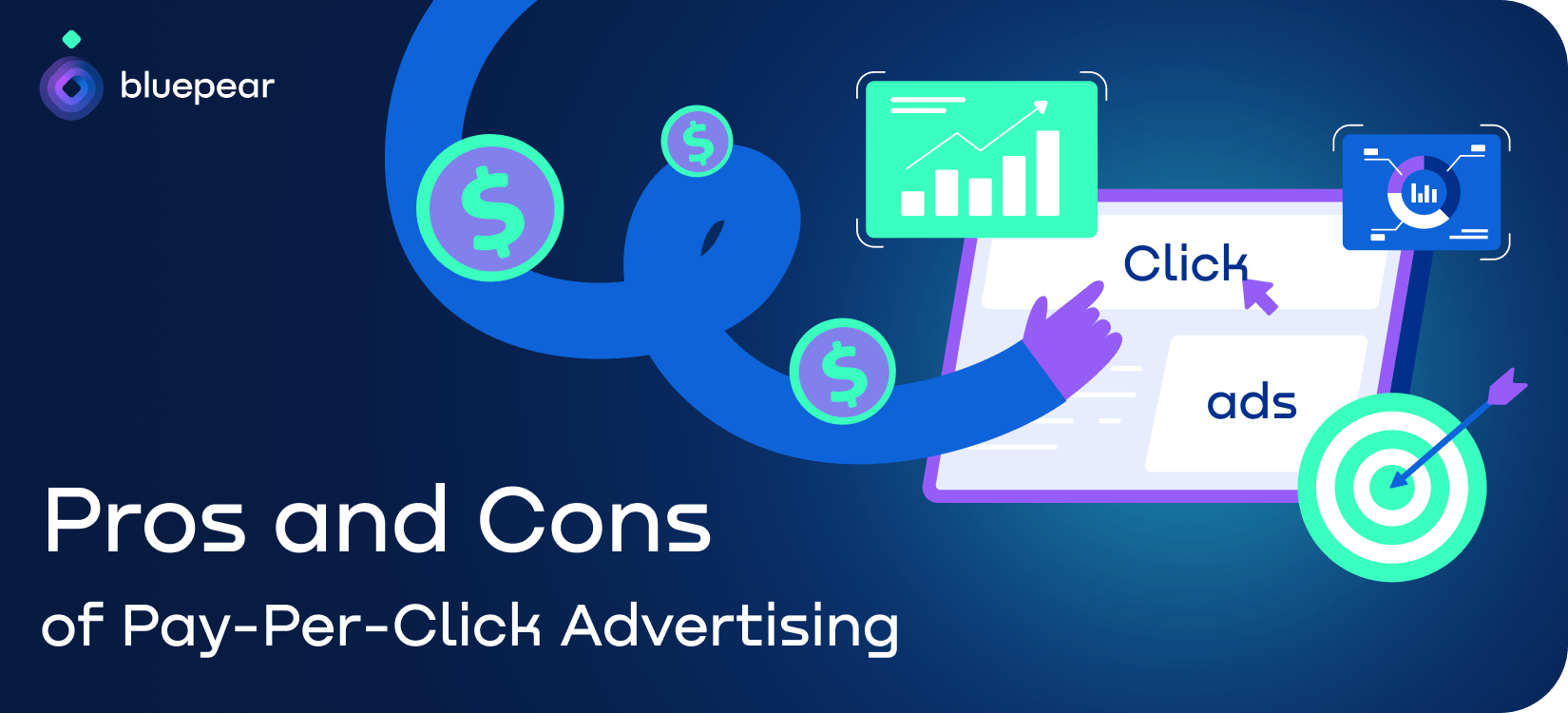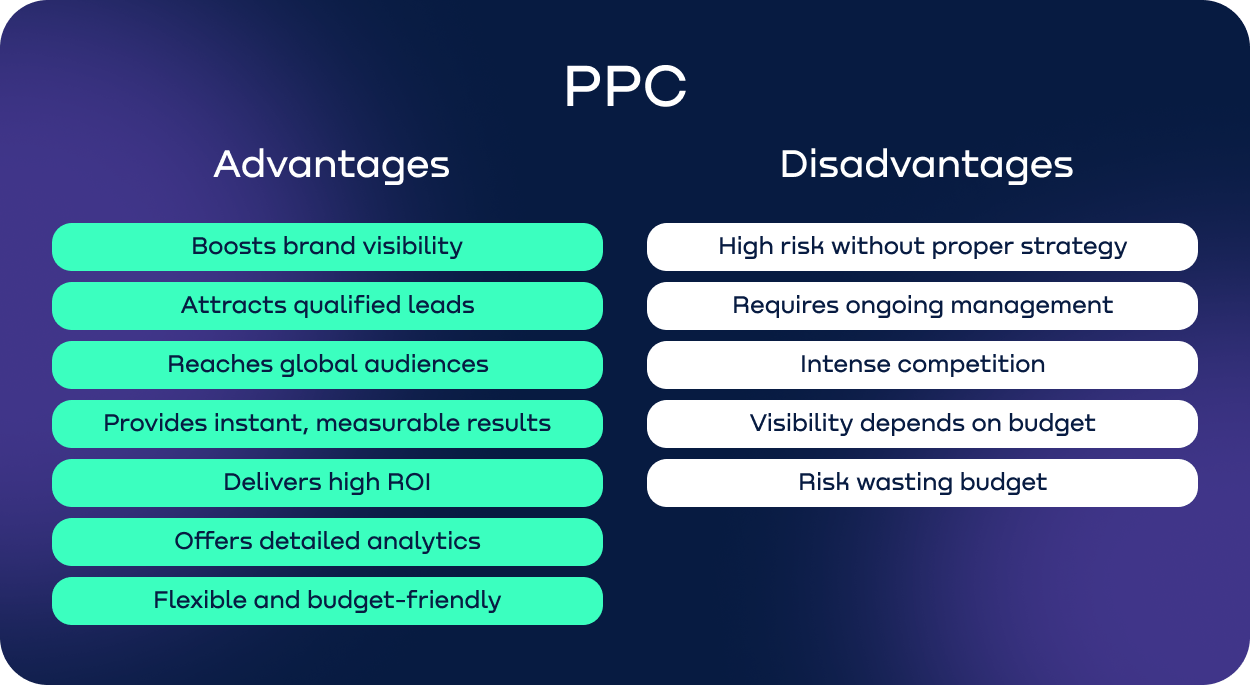Pros and Cons of Pay-Per-Click Advertising
13.12.2024
Contents
Businesses are constantly looking for effective ways to reach their target audience and boost online visibility. PPC has become a key focus for marketers looking to optimize their digital marketing strategies. PPC advertising offers a powerful, dynamic approach to online marketing, helping brands to connect with potential customers instantly.
PPC advertising provides a flexible and measurable method for companies to promote their products and services across various digital platforms. Unlike traditional marketing approaches, PPC advertising services offer precise targeting and immediate results, enabling businesses to optimize their marketing budgets and track performance in real-time.
As digital competition continues to grow, understanding the nuances of PPC advertising management has become essential for businesses wanting to stay ahead in the online. Let’s explore the details of PPC advertising, its benefits and potential challenges.
What is PPC advertising?
PPC is a digital marketing model where businesses pay only when a user actually clicks on their ad. This approach to online marketing offers a cost-effective and measurable way to reach potential customers.
In the PPC advertising, businesses bid on specific keywords and pay a fee each time their ad is clicked. Unlike traditional advertising, PPC offers precise targeting and instant visibility. This model essentially transforms the traditional marketing landscape by allowing businesses to connect with their ideal audience with exceptional accuracy.
The PPC management includes several key steps:
• Creating targeted ads;
• Choosing relevant keywords;
• Setting a budget;
• Competing in online ad auctions;
• Paying only for the clicks their ads received.
PPC advertising services provide businesses with a transparent and flexible marketing solution. Unlike traditional advertising methods, it allows companies to track every interaction, measure ROI, and make real-time adjustments to their strategy.
Types of PPC Advertising
PPC advertising offers diverse strategies for businesses to reach their target audience across multiple digital channels. Understanding these different types can help organizations improve their PPC strategy.
1. Paid Search Marketing. PPC advertising is commonly used in paid search marketing as a text-based advertisement that appears in search engine results. Platforms like Google Ads and Microsoft Ads allow businesses to show targeted PPC ads to users searching for specific keywords.
2. Social Media Advertising. Social media platforms are now key channels for PPC advertising. Platforms like Facebook, Instagram, LinkedIn, and Twitter offer advanced targeting options. PPC advertising on these networks enables businesses to reach audiences based on demographics, interests, behaviors, and other specific criteria.
3. Display Marketing. PPC advertising extends beyond text-based format through display marketing. This type includes banner ads, rich media ads, video advertisements, and responsive display ads.
4. Affiliate Marketing. A unique form of pay-per-click advertising is affiliate marketing. This performance-based model involves partnerships with content creators and influencers who promote products or services. Businesses pay commissions only when specific actions are completed, such as sales or leads generated. PPC advertising in affiliate marketing provides a low-risk, high-reward approach to digital advertising.
Each type of PPC advertising offers unique benefits and can be strategically combined to create a well-rounded digital marketing campaign. The key is to understand the strengths of each approach and align them with your business goals. It’s highly recommended to work with PPC advertising services to maximize effectiveness.
How PPC Works
PPC involves several key steps that determine ad placement and how well they perform. These steps include selecting relevant keywords, setting bids, creating ads, and competing in ad auctions. All these elements ensure your ads reach the right audience at the right time, and drive traffic to your website. Working with PPC advertising services can help optimize ad campaigns and get higher performance results.
Keyword Selection Process
PPC management starts with keyword research. Advertisers identify and select keywords that potential customers are likely to use searching for their products or services. This process involves:
• Analyzing search volumes
• Evaluating keyword competitiveness
• Identifying long-tail and specific keywords
• Understanding user search patterns
Ad Auction Mechanism
When a user performs a search, PPC platforms like Google Ads trigger an instant auction to determine which ads will be shown and in what order. Key factors include:
• Bid amount
• Ad quality
• Relevance to search query
• Historical performance of the ad
Bid Strategies
PPC advertising services provide multiple bidding options, including:
• Manual bidding
• Automated bidding
• Target CPA (Cost Per Acquisition)
• Enhanced cost-per-click
• Target return on ad spend (ROAS)
Quality Score Importance
Pay-per-click advantages are significantly influenced by quality score. This metric evaluates:
• Ad relevance
• Click-through rates
• Landing page experience
• Historical performance
Ad Placement and Ranking
The final step in PPC advertising management is determining the ad's position. Platforms use a complex algorithm that combines bid amount and quality score to rank ads, ensuring the most relevant and high-quality ads get the best visibility.
Advantages and disadvantages of PPC Advertising
Just like any other form of advertising, PPC has a big list of advantages and disadvantages that should be considered when using this strategy.
Advantages of PPC Advertising
Precise Targeting
- Geographic location
- Demographics
- Interests
- Search behavior
Measurable Results
- Click-through rates
- Conversion rates
- Cost per acquisition
Budget Control
- Flexible spending limits
- Instant budget adjustments
- Precise cost management
Quick Adaptability
- Testing ad variations
- Rapid campaign modifications
- Immediate performance optimization
Disadvantages of PPC Advertising
Cost Challenges
-
High competition -
Expensive keywords -
Continuous investment required
Competitive Landscape
-
Intense [brand bidding](https://bluepear.net/blog/brand-bidding-in-affiliate-marketing) wars -
Potential for larger companies to dominate -
Complex market dynamics
Management Intensity
-
Constant monitoring -
Regular optimization -
Technical expertise
Click Fraud Risks
-
Potential for fraudulent clicks -
Need for vigilant tracking -
Possible financial losses
Learning Complexity
-
Technical platform knowledge -
Specialized skills -
Continuous learning

Conclusion
PPC advertising is a powerful digital marketing strategy to boost online visibility and reach specific audiences. PPC advertising services and platforms provide a flexible and trackable method to connect with potential customers on different digital platforms.
While PPC may seem complex, the pay-per-click advantages clearly outweigh the potential challenges for businesses willing to invest time and resources into strategic implementation. PPC management requires a thoughtful approach, combining technical expertise with creative marketing strategies.

